🍊 Friday Gazette: July 18, 2025
One year after Hawarden, six artists join city residency and UCR soccer opens with Big Ten games.
Beyond the gathering of thousands at Mount Rubidoux each Easter, Dr. Henry van Dyke's poem 'God of the Open Air' weaves a deeper connection between nature, faith, and the Riversiders on the mountain.

I wonder if Frank Miller, when he climbed up Mount Rubidoux early on Easter morning on April 11, 1909, thought that the Sunrise Easter Service that he and a few others celebrated in a simple service that day would continue and reach thousands of pilgrims over the years. Except for three years during World War II and three times during pandemics, this early morning Easter Outdoor Sunrise Service has continued to this day. This morning will mark another celebration when worshippers climb the mountain to hear the glorious Easter message.
Starting in 1911, DeWitt Hutchings added a feature to the service, the reading of the poem “God of the Open Air,’ by Dr. Henry van Dyke. DeWitt had attended Princeton University, and one of his professors had been Dr. Henry van Dyke. Between 1911 and 1947, Hutchings read this poem at the Easter Sunrise Service twenty-seven out of the thirty-six ceremonies.
However, in 1913, DeWitt gladly gave over his undertaking to his mentor, Dr. Henry van Dyke. Dr. van Dyke explained that its inspiration came from the fact that it was under the open blue sky that the Great Master had lived, taught, lifted his cross, and walked among the flowers on the first Easter morning. For this fifth anniversary of the service, he wrote four new special lines that expounded the Easter message.
And so, on Easter morn, His victory won,
Breaking the mortal bars that seal the tomb,
In a fair garden filled with flowers abloom,
The risen Jesus met the rising sun.
These added words were not in the pre-printed service folder for 1913, but they would appear in subsequent printed programs. In the collection of the Museum of Riverside is a copy of the 1913 service with the added words written in by hand by Henry van Dyke. Van Dyke also added a personal note: “For my friend DeWitt Hutchings who has read these lines on Mt Rubidoux, these new lines are written by his friend Henry van Dyke.
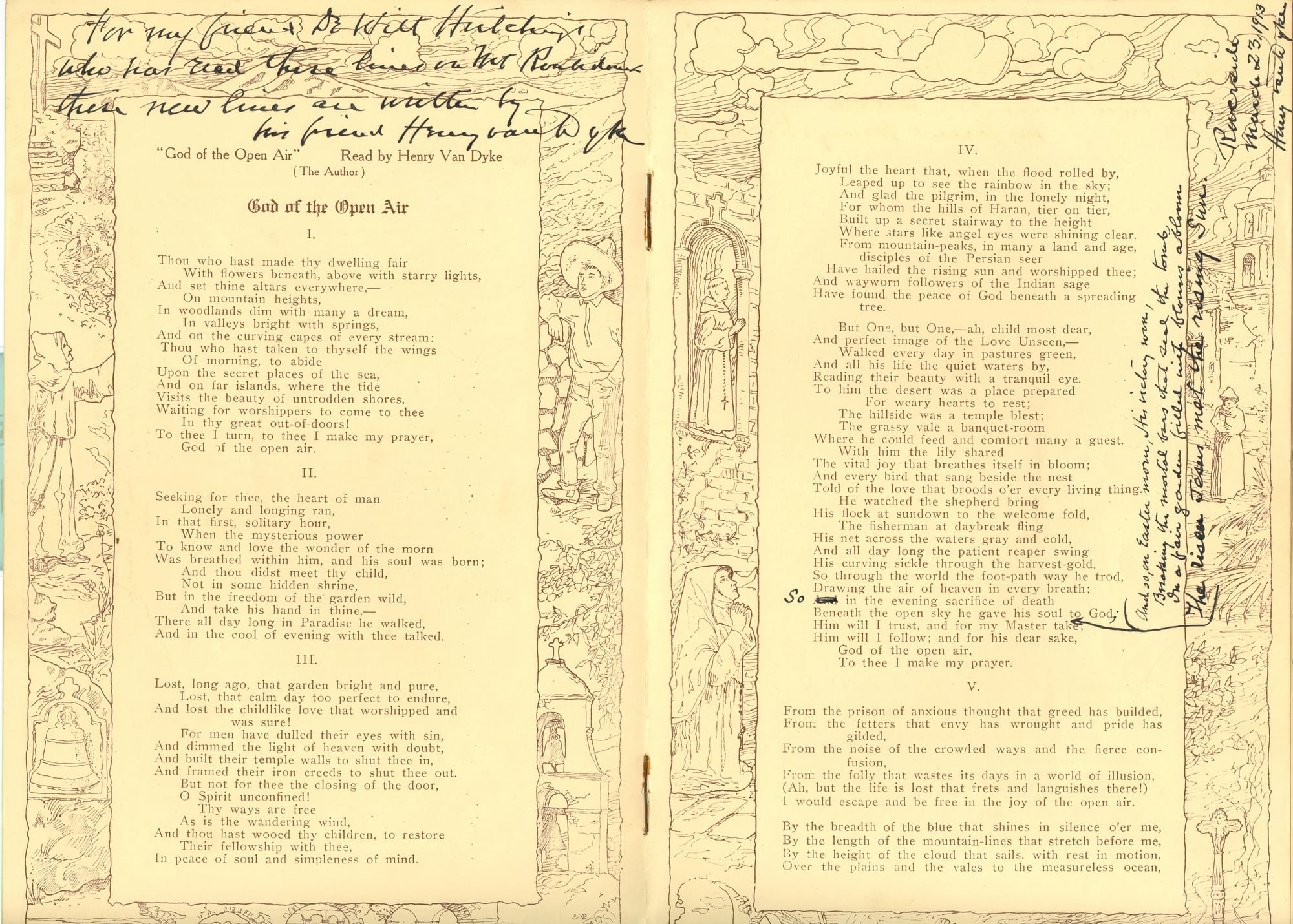
A reporter who was on the mountain that morning acclaimed that “Dr. Van Dyke has a voice of rare carrying quality, and the author held his auditors’ most sympathetic attention during the recital.”
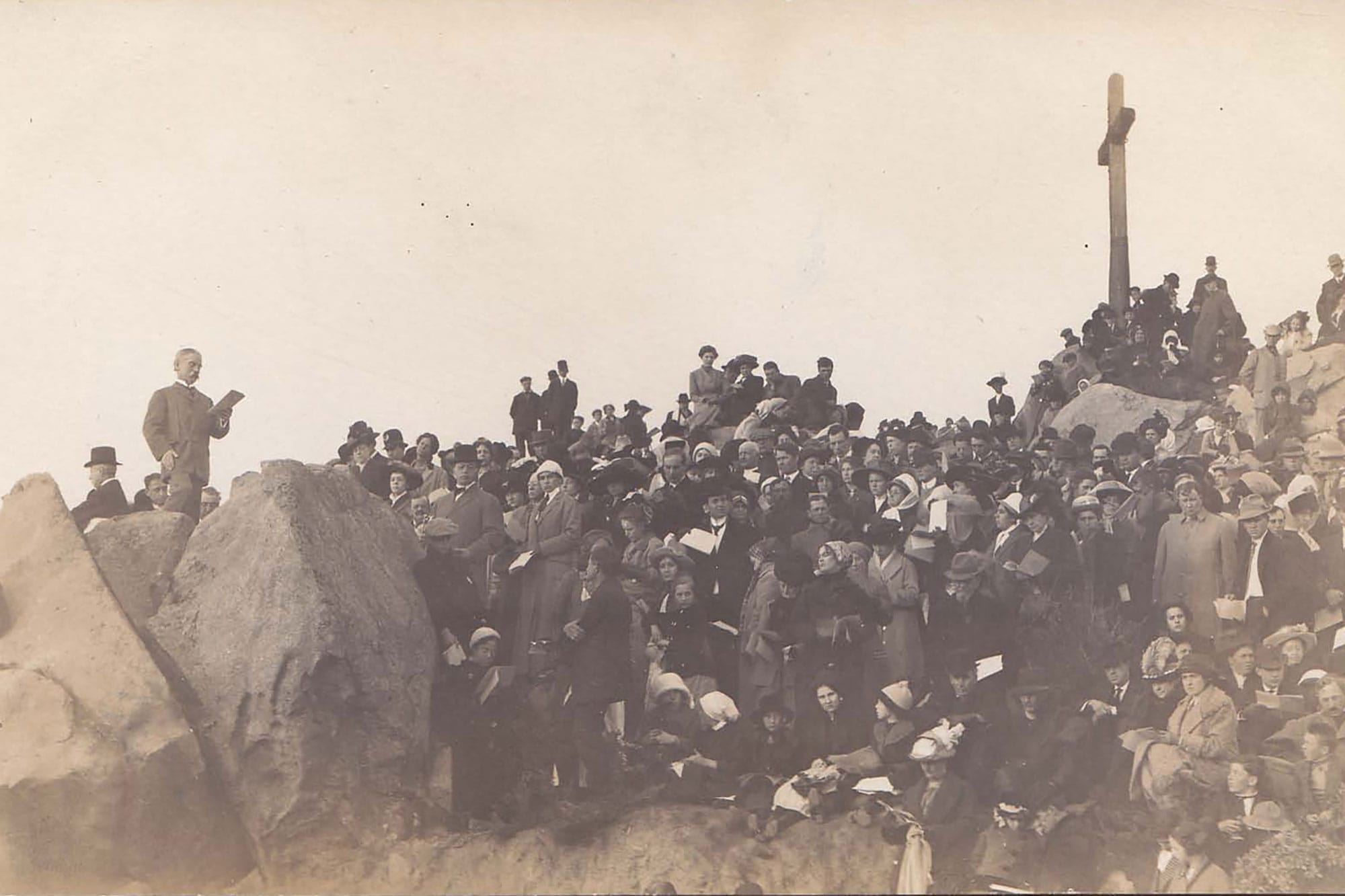
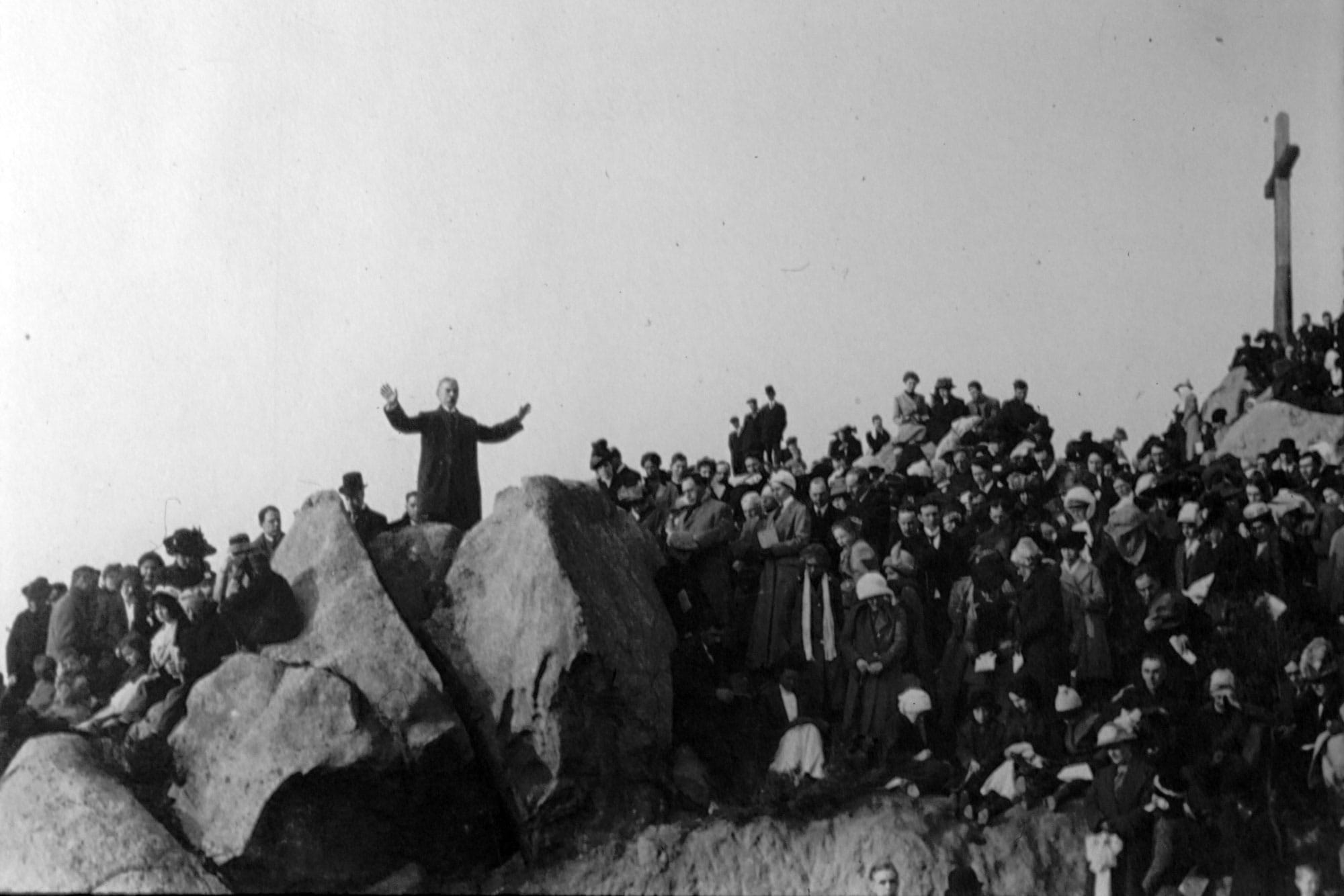
Dr. Henry van Dyke reading his poem (Courtesy of the Local History Archives, Riverside Main Library) and giving the blessing at the end of the 1913 service (Author’s Collection).
It was not until 1927 that Van Dyke returned to Riverside and the Mission Inn. He arrived in Riverside on March 2 for an extended stay for rest and to participate in the annual Easter sunrise service once again later during his stay on April 17. An estimated 15,000 people attended the ceremony on the mountain that year.
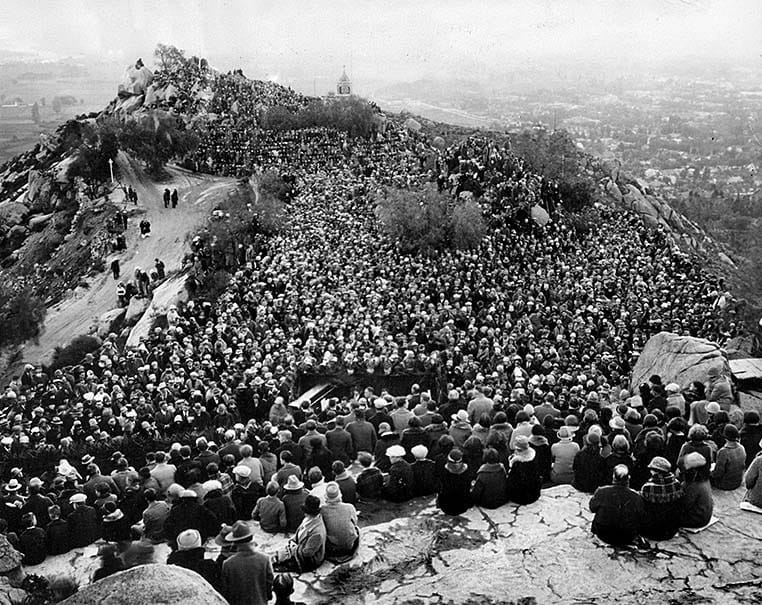
Dr. Henry Van Dyke died quietly at his home in Princeton on April 10, 1933. He was buried in Princeton Cemetery.
Two years later, a memorial plaque was unveiled on Easter Sunday, April 21, 1935, in memory of Henry Van Dyke, the author of the famous poem read annually at the Easter service. This would be the last tablet set on Mount Rubidoux during Frank Miller’s life. The details for the plaque were handled by DeWitt Hutchings, as seen from the letters between Hutchings and William Sharp, who designed the plaque. This was the first year that Miller did not make the pilgrimage to the top of the mountain for the service he had begun in 1909. The tablet was unveiled by Frank Miller Hutchings, Frank Miller’s grandson. The tablet was set into the granite boulder, often called the Pulpit Rock, as it was the setting very often used for the Easter speakers.
Below the engraved head of Van Dyke are words of tribute and then the lines which he had added to his poem back in 1913 while in Riverside. The guest speaker that year who had the privilege of reading Van Dyke’s poem was his son, the Reverend Tertius Van Dyke.
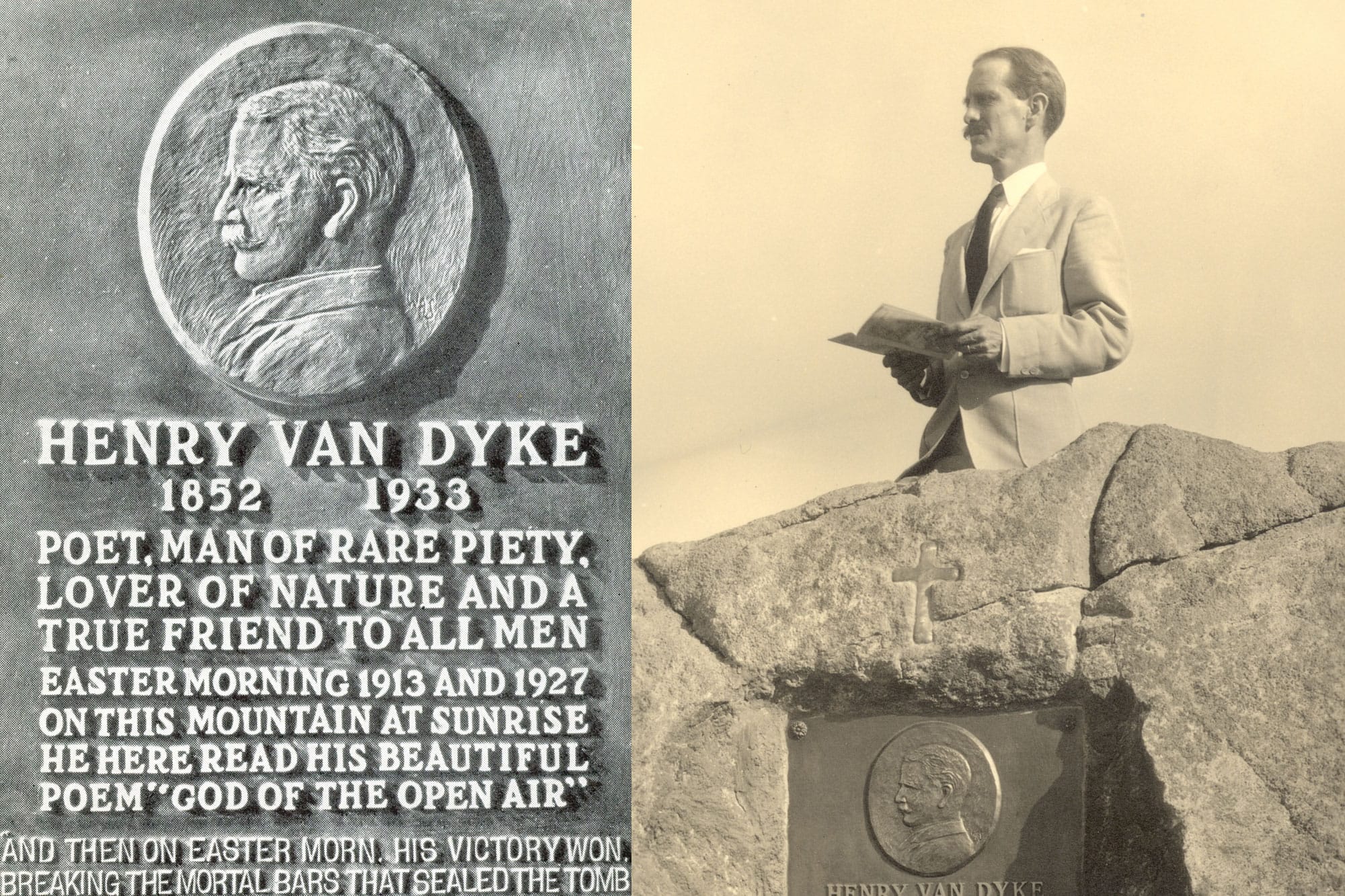
Frank Miller’s legacy lives on in various areas of Riverside. But today, we remember his legacy in giving us the annual Mount Rubidoux Easter Sunrise Service, the oldest continual outdoor non-denominational sunrise Easter service in the United States. And we honor Dr. Henry van Dyke whose poem was read for many years for the Easter service, but especially the four lines he added for Easter when he visited the city in 1913. The poem has not been read for several years, but the Easter message is still proclaimed from the mountaintop.
Let us email you Riverside's news and events every morning. For free!